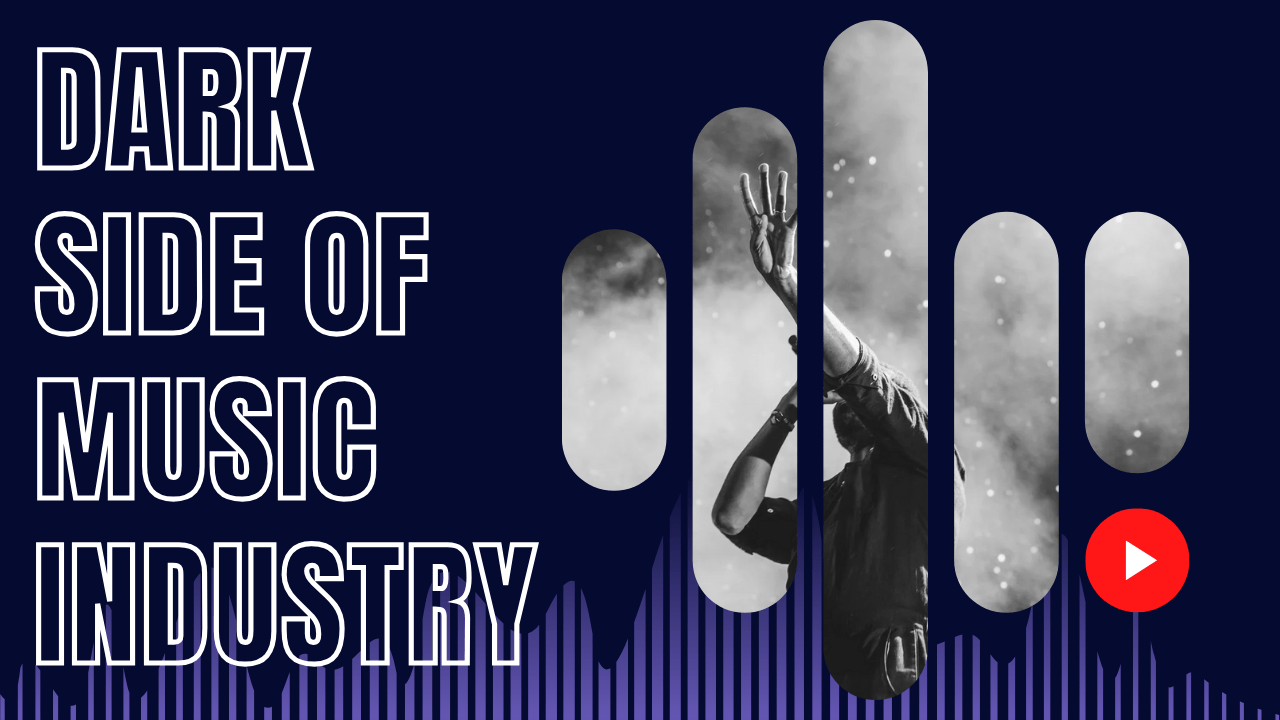The music industry often seems like a world full of glamour, fame, and success. However, behind this glittering image lies a darker reality that many don’t see. The dark side of the music industry includes various issues that affect artists, from exploitation to mental health struggles. This blog will explore these hidden aspects and help you understand the challenges artists face.
The Illusion of Glamour
The Allure of Fame
Fame and fortune attract many people to the music industry. It promises recognition, wealth, and admiration. Yet, the reality is often different. Behind the scenes, artists face hard work, constant pressure, and harsh realities. The industry’s glamorous image hides these struggles, making it seem more perfect than it really is.
The Cost of Success
Success in the music industry often comes with sacrifices. Many artists give up personal relationships, privacy, and even their health. The pressure to maintain a public image can be overwhelming. It can lead to burnout and other mental health issues. This is a significant part of the dark side of the music industry. Additionally, the constant scrutiny from the public and media can be emotionally exhausting. Artists are judged not only on their music but also on their appearance and personal lives. This can make it hard for them to live a normal life.
Exploitation and Unfair Contracts
Unfair Record Deals
One major problem in the music industry is unfair record deals. Young and inexperienced artists often sign contracts without fully understanding them. They are drawn by the promise of fame and a record deal. However, these contracts can be heavily one-sided. They often favor the record labels, leaving artists with little control over their work. This is a common issue in the dark side of the music industry.
The Power Imbalance
There is a significant power imbalance between artists and record labels. Labels often have control over an artist’s career, including their music and image. This control can limit an artist’s creativity. They may be forced to make music that is commercially viable rather than what they truly want to create. This pressure to conform can lead to frustration and a loss of artistic identity.
Financial Struggles
The Myth of Wealth
Many people believe that the music industry is full of wealth. However, this is not the case for most artists. The truth is, a large portion of the money from music sales and streaming goes to record labels and distributors. Artists often receive a small percentage. This financial struggle is a key part of the dark side of the music industry.
While some top artists earn a lot, many others find it hard to make a living. The costs of production, marketing, and touring can be high. These expenses often leave artists with little profit. The myth of wealth in the music industry hides these financial challenges.
The Challenge of Royalties
Making a sustainable income from music is tough, especially with the rise of digital streaming. These platforms provide exposure but pay low royalties. Therefore, many artists rely on live performances and merchandise sales to earn money. The dark side of the music industry includes these financial difficulties. Artists often struggle to make ends meet, which can affect their ability to continue making music.
Mental Health Issues
The Pressure of Perfection
The music industry often demands perfection from artists. This pressure can lead to various mental health issues, such as anxiety, depression, and burnout. The need to meet public expectations and industry standards can be overwhelming. This is a significant aspect of the dark side of the music industry.
Artists are expected to present a flawless image, both on and off stage. This expectation can be stressful and exhausting. The pressure to be perfect can take a toll on their mental well-being, making it hard to cope with everyday challenges.
Substance Abuse and Addiction
Substance abuse and addiction are common problems in the music industry. The lifestyle that comes with fame often includes easy access to drugs and alcohol. This can quickly lead to dependency. The dark side of the music industry is full of stories about talented artists whose lives and careers were damaged by addiction.
The pressure and stress of the industry, combined with the availability of substances, create a dangerous environment. Many artists turn to drugs and alcohol to cope with these pressures. Unfortunately, this often leads to a cycle of addiction, making it even harder to manage their careers.
Lack of Creative Control
Artistic Censorship
Many artists enter the music industry with a desire to express themselves creatively. However, the dark side of the music industry often involves artistic censorship. Record labels and managers may pressure artists to produce commercially viable music rather than allowing them to explore their true artistic vision. This can lead to frustration and a loss of identity.
The desire for commercial success often leads to a compromise in artistic integrity. Artists may feel pressured to conform to popular trends and create music that appeals to a mass audience. This can stifle their creativity and prevent them from producing work that reflects their true artistic voice. The dark side of the music industry is highlighted by these instances of artistic compromise, where artists are forced to choose between creative freedom and financial success.
The Struggle for Independence
Independent artists often face significant challenges in gaining recognition and financial stability without the backing of a major label. While independence offers greater creative freedom, it also means shouldering the full responsibility of managing one’s career. This can be daunting, especially in an industry where connections and financial resources play a crucial role.
The dark side of the music industry includes the difficulties faced by independent artists in navigating the industry. Without the support of a major label, independent artists may struggle to access the resources and opportunities needed to succeed. This can include challenges in securing funding, marketing their music, and reaching a broader audience.
The Dark Side of Touring
The Physical Toll
Touring is a crucial part of an artist’s career. It offers a primary source of income and a way to connect with fans. However, the dark side of the music industry includes the physical toll that extensive touring can take on an artist. Long hours, irregular schedules, and constant travel can lead to exhaustion, burnout, and various health issues.
The physical demands of touring can be overwhelming, with artists often performing night after night in different cities. This constant travel can take a toll on their physical health, leading to issues such as sleep deprivation, fatigue, and weakened immune systems. The dark side of the music industry is marked by these physical challenges, which can affect an artist’s ability to perform and sustain their career.
The Impact on Personal Life
The demanding nature of touring can also strain personal relationships. Being away from home for extended periods can create a sense of isolation and disconnect from loved ones. The dark side of the music industry often includes the sacrifices artists must make in their personal lives to sustain their careers.
The constant travel and demanding schedules can make it difficult for artists to maintain relationships with family and friends. This can lead to feelings of loneliness and isolation, as artists spend much of their time on the road. The dark side of the music industry is highlighted by the emotional toll that touring can take on an artist’s personal life.
The Role of Social Media
The Double-Edged Sword
Social media has become an integral part of an artist’s career, offering a platform for self-promotion and fan engagement. However, it also exposes artists to a constant barrage of criticism and scrutiny. The dark side of the music industry is amplified by the pressures of maintaining a positive public image and dealing with online negativity.
While social media can be a powerful tool for building a fan base and promoting music, it also comes with its challenges. The anonymity of the internet can lead to cyberbullying and negative comments, which can be emotionally damaging. The dark side of the music industry includes the impact of social media on an artist’s mental health, as they navigate the complexities of online presence.
Mental Health and Online Presence
The need to maintain an active online presence can exacerbate mental health issues. The pressure to stay relevant and constantly engage with fans can be overwhelming. Additionally, the anonymity of the internet can lead to cyberbullying, further contributing to an artist’s emotional distress.
The dark side of the music industry is marked by the challenges artists face in managing their online presence. The pressure to present a perfect image and constantly interact with fans can lead to anxiety and stress. Artists may feel the need to curate their lives for public consumption, leading to a loss of privacy and authenticity.
The Stigma of Seeking Help
Mental Health Stigma
Despite the prevalence of mental health issues in the music industry, there is still a stigma attached to seeking help. Many artists fear that admitting to mental health struggles will damage their careers or make them appear weak. This stigma is a significant barrier to addressing the dark side of the music industry and providing support to those in need.
The fear of being perceived as weak or incapable can prevent artists from seeking the help they need. This can lead to a worsening of mental health issues, as artists struggle to cope with the demands of the industry. The dark side of the music industry includes the stigma surrounding mental health, which can prevent artists from receiving the support they need.
The Importance of Support Systems
Building a strong support system is crucial for artists navigating the challenges of the music industry. This includes trusted friends, family, and mental health professionals. Addressing the dark side of the music industry requires breaking down the stigma surrounding mental health and encouraging open conversations.
Having a support system can provide artists with the emotional and practical support they need to manage the pressures of their careers. This can include professional help, such as therapy or counseling, as well as support from loved ones. The dark side of the music industry highlights the importance of support systems in helping artists navigate the challenges they face.
The Path Forward
Advocating for Fair Practices
To address the dark side of the music industry, it is essential to advocate for fair practices and better support systems for artists. This includes pushing for transparent contracts, fair compensation, and mental health support. By raising awareness of these issues, we can work towards a more equitable and supportive industry.
Advocating for fair practices involves holding record labels and industry professionals accountable for their actions. This can include lobbying for policy changes, supporting artists’ rights, and promoting transparency in the industry. The dark side of the music industry can be mitigated by these efforts to create a fairer and more supportive environment for artists.
Empowering Artists
Empowering artists to take control of their careers is another crucial step. This includes providing education on industry practices, financial management, and mental health resources. By equipping artists with the tools and knowledge they need, we can help them navigate the dark side of the music industry and build sustainable careers.
Empowering artists involves providing them with the resources and support they need to succeed independently. This can include access to legal advice, financial planning, and mental health support. The dark side of the music industry can be addressed by empowering artists to take control of their careers and advocate for their rights.
Conclusion
The dark side of the music industry is a complex and multifaceted issue. From exploitation and financial struggles to mental health challenges, artists face numerous obstacles that are often hidden from the public eye. By shedding light on these issues, we can foster a greater understanding of the realities of the music industry and advocate for change. It is essential to support artists not only in their creative endeavors but also in their well-being, ensuring a healthier and more equitable industry for all.
For further reading, explore these related articles:
- The Role of Journalism in the Music Industry: Unveiling Truths and Celebrating Art
- Common Disputes in Music Rights and How to Resolve Them
- Ten Great Albums You May Have Missed in 2024
For additional resources on music marketing and distribution, visit Deliver My Tune.






